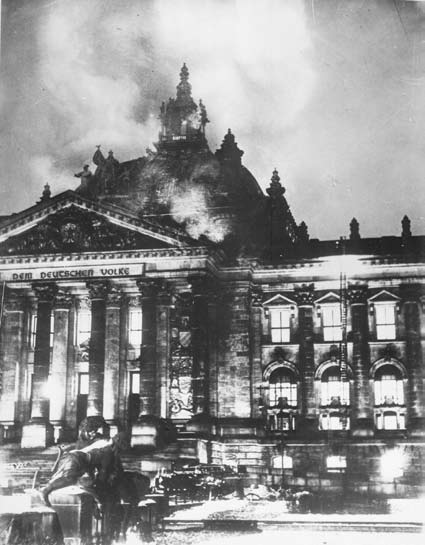This Week in History:
February 27 - March 5, 1933
The Reichstag Fire
February 2011
 The Reichstag Fire in Berlin, 1933. |
A dramatic, history-making event occurred on February 27, 1933—some 78 years ago. That event was the Reichstag Fire in Germany, the set-up job which provided the pretext under which Adolf Hitler passed the "emergency laws," and moved toward imposing the Nazi reign of terror, first on Germany, and then on a world driven into the horrors of fascism and World War II. Today, we see the Bush Administration, particularly through the agency of Attorney General John Ashcroft, moving precisely in that direction, using the pretext of "terrorist threats" to rip up the U.S. Constitution, its protections, and its commitment to the general welfare of the population.
The context for the Reichstag Fire was established by the installation of Hitler as German Chancellor on January 30, 1933. That installation followed the failure of Germany's anti-fascist institutions, including the Social Democrats and the military, to push through the employment-public works plan that had been put forward by economist Wilhelm Lautenbach, the follower of American System economist Friedrich List, and promoted by Chancellor Kurt von Schleicher. While it is true that Anglo-American banking circles played a crucial behind-the-scenes role in promoting Hitler, and dumping von Schleicher, the dumping of von Schleicher in favor of Hitler would not have been possible if the Social Democrats, in particular, had not stupidly—one could say suicidally—refused to work with the military man von Schleicher, to stop Hitler. On the other side, the military and conservatives were wooed by Hjalmar Schacht and other bankers into withdrawing support from von Schleicher, with the argument that he was a "Bolshevik" for advocating the Lautenbach plan.
In effect, Hitler was brought into the Chancellorship by a constitutional coup, which could have been stopped.
But that was not enough for Hitler's backers. Given that Hitler's party was not in the commanding position he needed in order to impose the dictatorship which their economic and geopolitical policy demanded, there needed to be an incident, a provocation, to give Hitler emergency powers.
That incident came on Feb. 27, when the unprotected building of the German Parliament, or Reichstag, was burned down in an arson attack. This led to the Nazi government of Prussia, under Hermann Goering, launching a wave of terror against the political opponents and rivals of the Nazis. Laws were drawn up giving the Hitler government emergency powers to effectively rule by decree, and they were passed by the Parliament.
Why did they pass? In the evaluation of Lyndon LaRouche, you have to put responsibility on Hitler's opponents in the Parliament. "The immediate, foolish response to Hitler's appointment as Chancellor, from the Communists, Social Democrats, and others, was, in effect, 'Wait until the Germans begin to see what Hitler is like; they will turn to us.' It did not work out that way. See the tempo of events leading into Hitler's consolidation of dictatorial and strategic power." (See "Al Gore and Adolf Hitler," EIR, Jan. 8, 1999.)
At a certain point, as Hitler's police powers strengthened, resistance became virtually futile.
It is precisely this danger that Lyndon LaRouche warned of back in January 2001, when John Ashcroft was nominated by the President to become Attorney General of the United States. It was clear then that, as the international financial crisis deepened, Ashcroft would move to seize dictatorial powers, using any pretext which became available. In the wake of Sept. 11, clearly Ashcroft was restrained from carrying out his full program, one that had actually been laid out by the Conservative Revolutionaries long before. But the directionality has been clear, and has been speeding up.
And, why was Ashcroft able to carry out his agenda? Just as with the Communists and Social Democrats against Hitler, leading opponents of the police-state agenda refused to take the aggressive, effective action, specifically a filibuster, which could have kept Ashcroft out of office. They said they'd wait for him to "discredit" himself. They would "give him a chance."
Will there be another "Reichstag fire" that Ashcroft can use to impose full dictatorial powers, as the crisis gets a lot worse? That's impossible to say. But no time should be lost in learning the lessons of the Reichstag Fire now.
The original article was published in the EIR Online’s Electronic Intelligence Weekly, as part of an ongoing series on history, with a special emphasis on American history. We are reprinting and updating these articles now to assist our readers in understanding of the American System of Economy.
